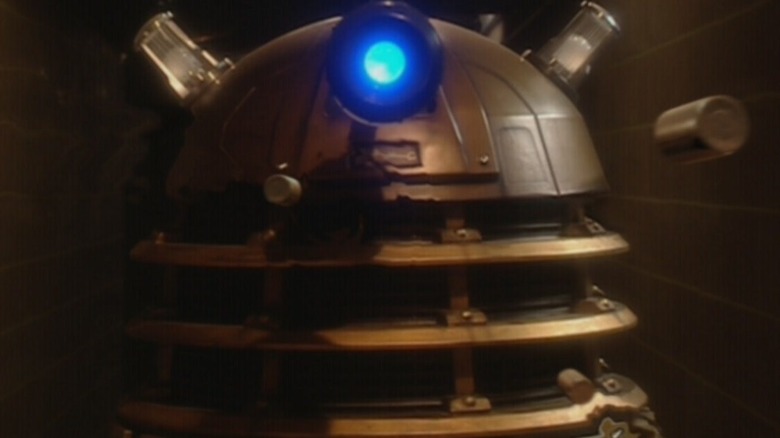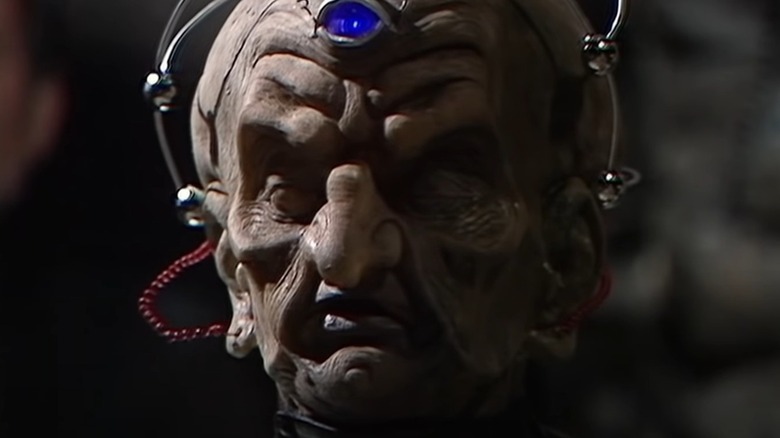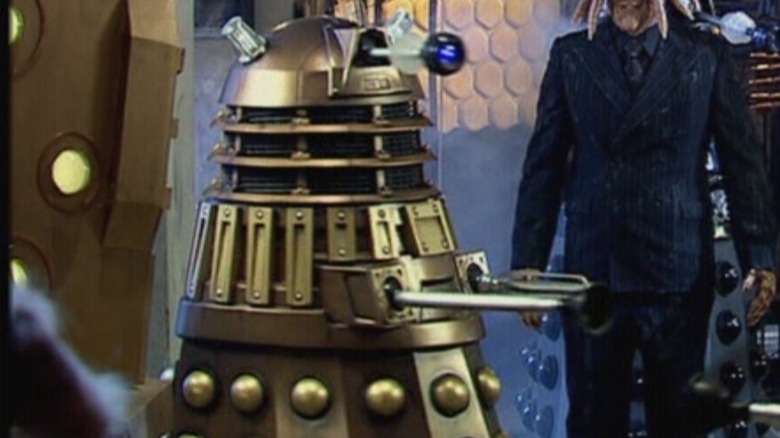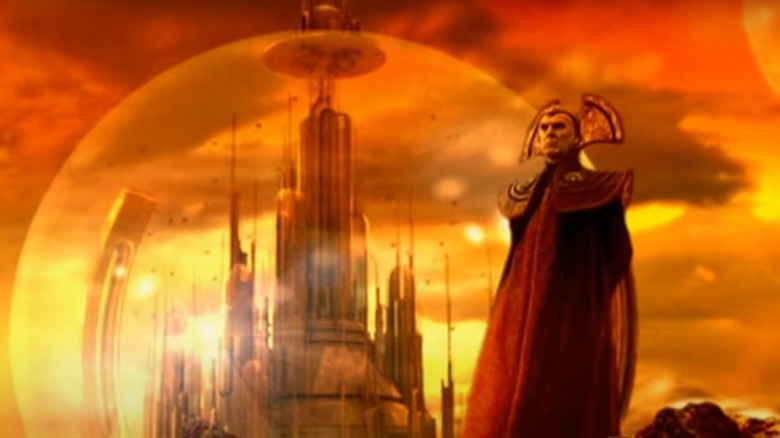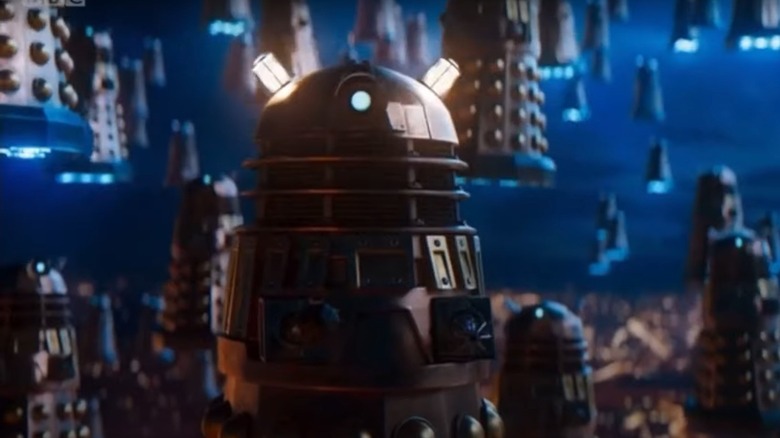The Daleks' In Doctor Who Finally Explained
The BBC science fiction powerhouse, "Doctor Who" — which follows a time-traveling alien on their adventure across the universe(s) — features a wide variety of extraterrestrial life for viewers to enjoy. Most of these species, like the Judoon (bipedal rhinos), the Adrozani Trees (bipedal plants), and the Silents (scary, bipedal businessmen), are functionally humanoid in design. The Doctor's greatest foe, however, is more easily misconstrued as a Roomba. The murderous vacuums known as Daleks have been a staple antagonist since their first appearance in 1963, when they faced off against the First Doctor (William Hartnell).
Since then, they've clashed with every iteration of the Doctor and were seen as recently as 2021 New Years' Special, "Eve of The Daleks," where they fought the Thirteenth Doctor (Jodie Whittaker). As "Doctor Who" delights in canonical retcons via messy time travel, it can be strenuous to untangle the chronology and expose any true linearity, especially when it comes to the Daleks, whose haphazard usage of time travel is even less structured than the Doctor's own. BBC, for their part, recognizes this struggle and published a book called "Dalek: Mark III Travel Machine Combat Training Manual" in an effort to tie everything together into a cohesive story.
In accordance with the best current understanding, here's the tale of the Daleks and how they came to be.
Davros creates the Daleks to secure the future of Skaro
The Daleks are not a naturally occurring species. Rather, they are the result of a series of horrible experiments. On the distant planet of Skaro, in the distant past, two humanoid races –- the Kaled and the Thals –- fight a disastrous war that leaves their home world violently irradiated and predominately inhospitable. In response, a Kaled scientist by the name of Davros devises a plan to secure the future of his race. His schemes lead to the realization that Kaleds can only survive through expedited evolution (read: vicious, forced mutation).
His experiments, which he hides in the future because no one respects the sacred arc of time, warp the Kaled into the squid-like creatures we're familiar with, the things that pilot the Dalek mech suits. When Davros reveals his plan to his people, he kills anyone who disapproves. Now, with a synthesized armada that shares his superiority complex, Davros sends his Daleks into space, seeking a new planet for his "people" to habitat.
Fun aside: Davros only survives his planet's hardships because The Twelfth Doctor (Peter Capaldi) protects him as a child, even though The Doctor knew that doing so would allow Davros to grow up and create the Daleks in his future (aka the Doctor's past). The Doctor's actions at that moment were in direct opposition to his purpose in that timestream, as he was sent to end the Daleks before they even began.
The Daleks war for expansion and dominion
A faction of the Daleks stay on Skaro, while another breaks off into space to follow Davros' will of expansion. It is instantly clear that the Daleks craved more than a new planet — they craved universal dominion. Their first technical encounter with The Doctor occurs when they invade earth in the 22nd century, hellbent on refitting the planet as a mobile headquarters. A Dalek Death Star, if you will. The Doctor foils their designs, and thus begins a millennia-long feud. It is around this time that the Daleks take after their creator and experiment with time travel.
The Daleks then play a deadly game of hopscotch with the timestream, jumping wildly from point to point, always to encounter The Doctor, always to face defeat. Although the exact amount of time this takes is unclear, the Daleks meet the first eight iterations of The Doctor in this way. Eventually, the Daleks revive Davros with suspended animation technology in the hopes that he will give their galactic siege an edge. Instead, he creates a new strain of Daleks that cause a fun little Dalek civil war, which ultimately leads the obliteration of Skaro, their home planet.
Don't worry, they fix it. Time travel can work wonders.
The Daleks fight the Time Lords in The Great Time War
The Daleks and their excessive time meddling catches the attention of the Time Lords -– The Doctor's people –- and, unsurprisingly, so does the Daleks' attempt to assassinate their high council. These events stir the beginnings of a war that no one could hide from. The Great Time War, as it came to be known, threatens to destroy not just the Daleks and the Time Lords, but everything, everywhere, everywhen. An unnumbered regeneration of The Doctor, The War Doctor (John Hurt), fights in this war with such malice as to leave him permanently scarred.
The War Doctor chooses to use a weapon that will end the war in one fell swoop, but in the doing will snuff out both the Daleks and the Time Lords. He ends the Daleks. He ends the Time Lords. Except, not really, because both races survive, unbeknownst to him. The Time Lords survive by a joint effort between all of The Doctor's regenerations, and they are merely trapped in a pocket universe, though very much alive. The Daleks survive like cockroaches. A sole survivor makes its way to Earth in the 21st century. A fanatic cult of Daleks hide in a fixed moment in time (it doesn't make sense with exposition, either). The Dalek's Emperor -– it's just a really big Dalek -– survives and hides to rebuild an armada. The Daleks are scattered and sparse, yes ... but alive, and well, and ready to exterminate.
The Daleks survive extinction to fight again ... and again ...
The Daleks reunite their forces, despite The Doctor's best efforts. The Ninth Doctor (Christopher Eccleston) fights them with Rose Tyler (Billie Piper) and Jack Harkness (John Barrowman). The Tenth Doctor (David Tennant) fights them with Rose Tyler and Martha Jones (Freema Agyemen), and even meets a Dalek-Human hybrid. The Eleventh Doctor (Matt Smith) faces a full-blown Dalek army on the planet of Trenzalore, where they've grown so tired of his antics that the Daleks break their own rules and ally with The Doctor's other enemies. All of them, in fact. Technically, they kill him and destroy his TARDIS there ... but thanks to the wonders of time travel, it doesn't work out that way.
The Twelfth Doctor faces them at the beginning with Clara Oswald (Jenna Coleman) and we already know how that turns out. The Thirteenth — and most current — Doctor faces them with her entire cohort of Bradley Walsh, Tosin Cole, and Mandip Gill (Graham O'Brien, Ryan Sinclair & Yasmin Khan, respectively). With the Time War well and done with, it's likely that the Daleks will continue to crop up whenever the studio wants, free of plot contradiction. It is hopeful, however, that they opt to create new points in time for the flying trash cans to appear, instead of looping them back into previous chronologies.
